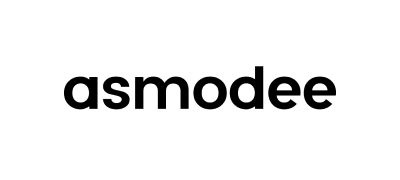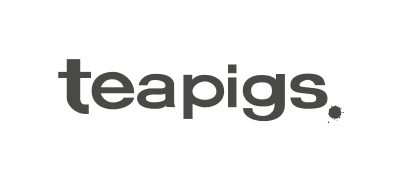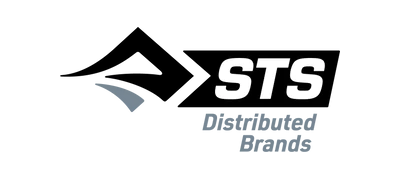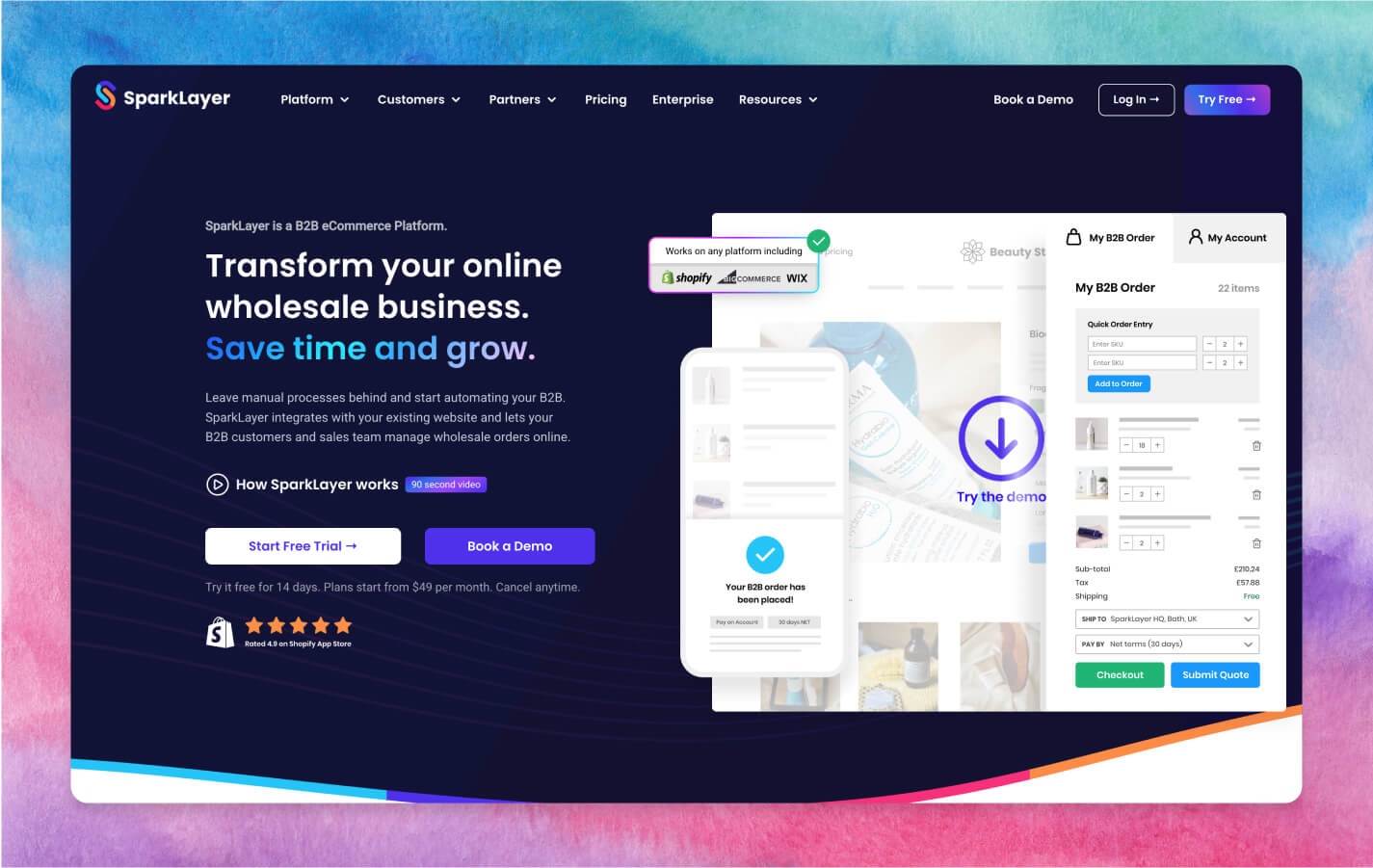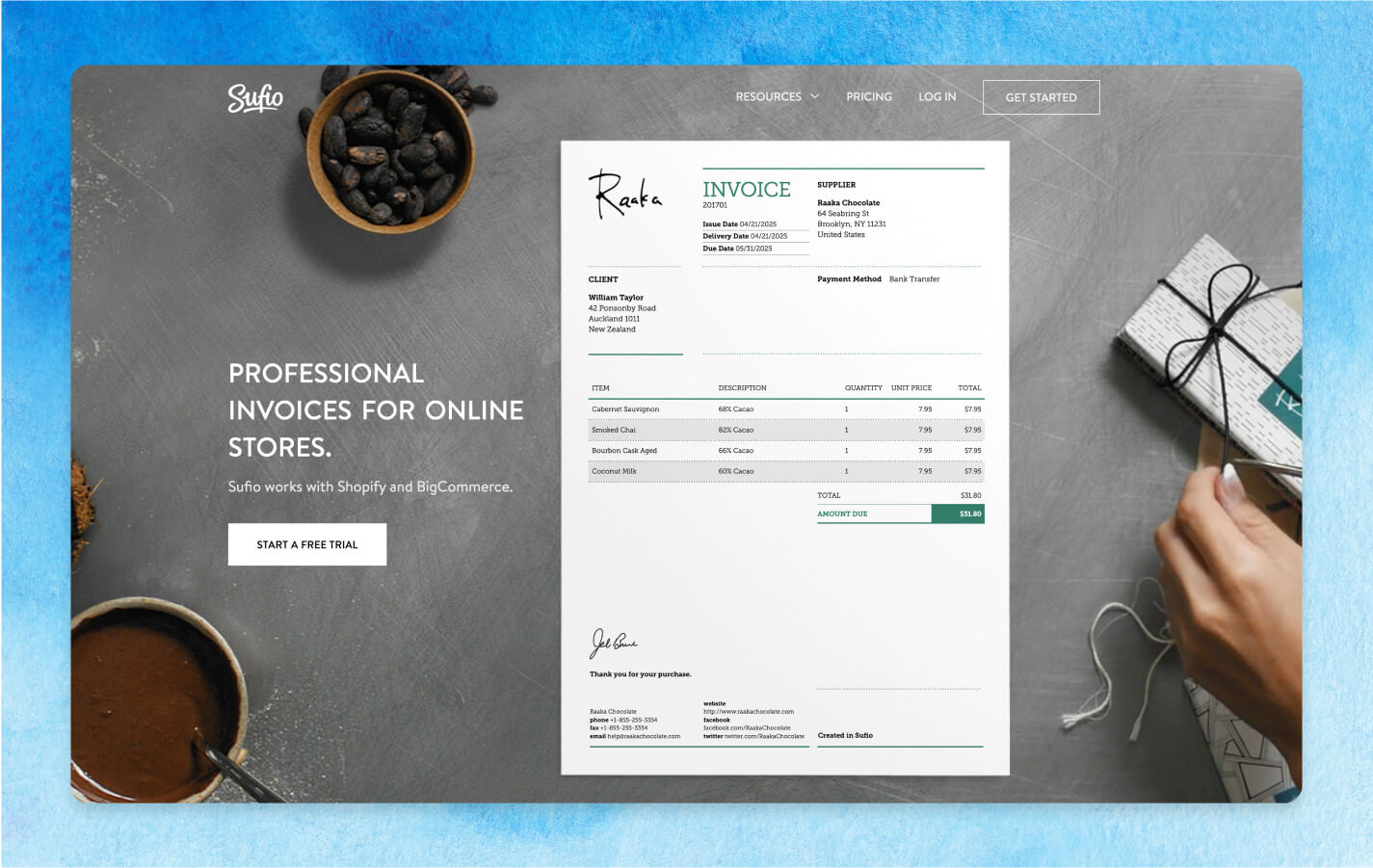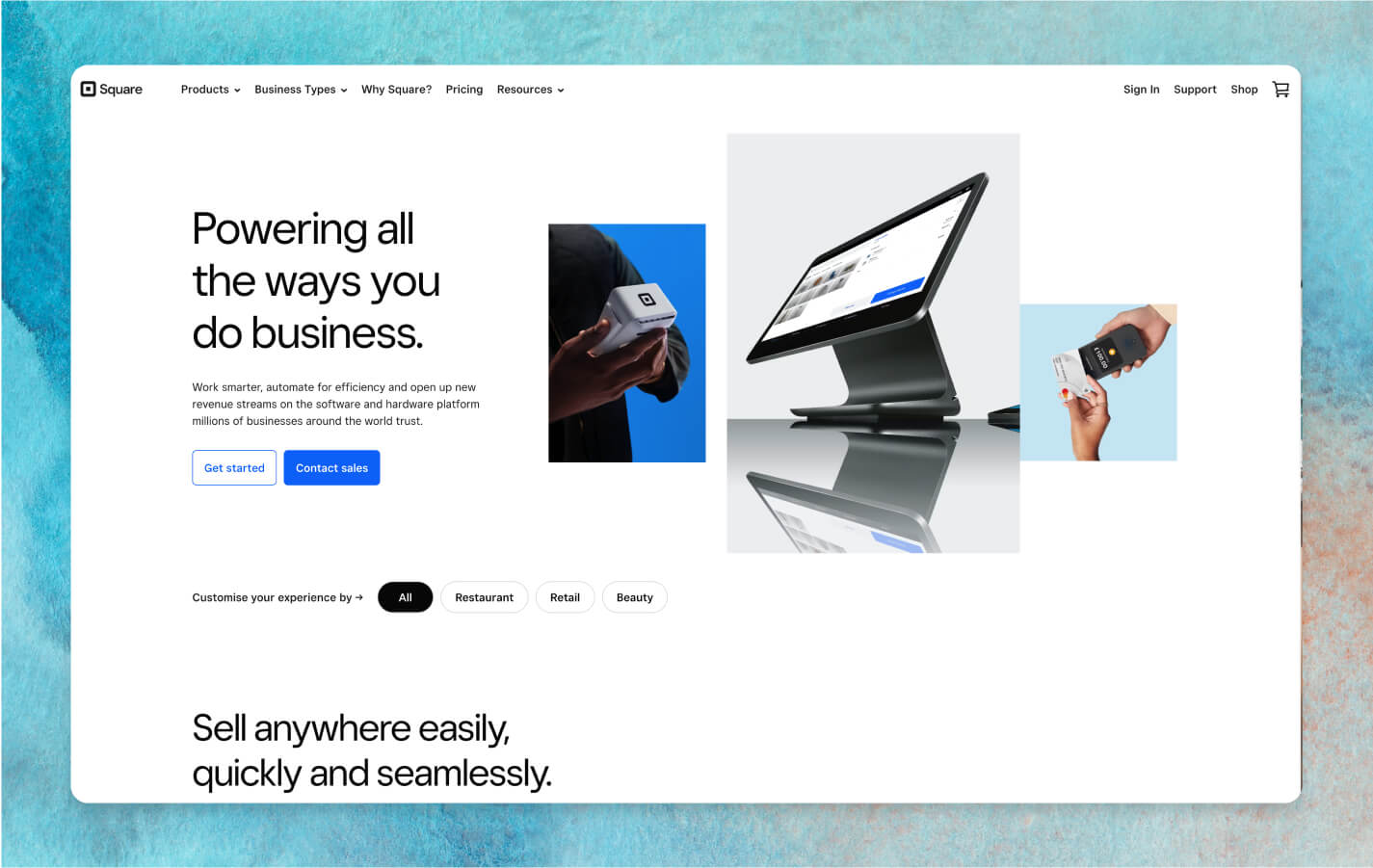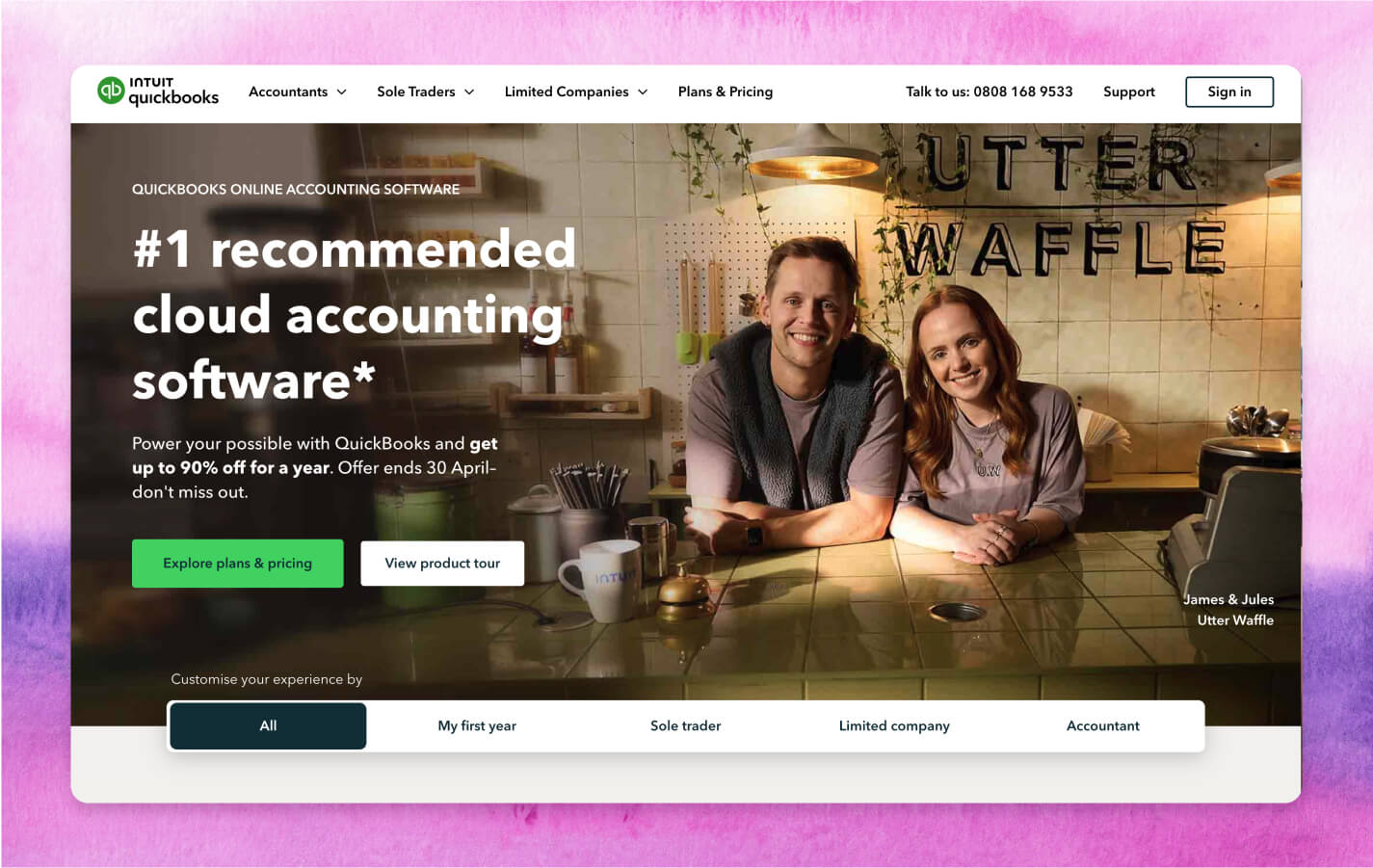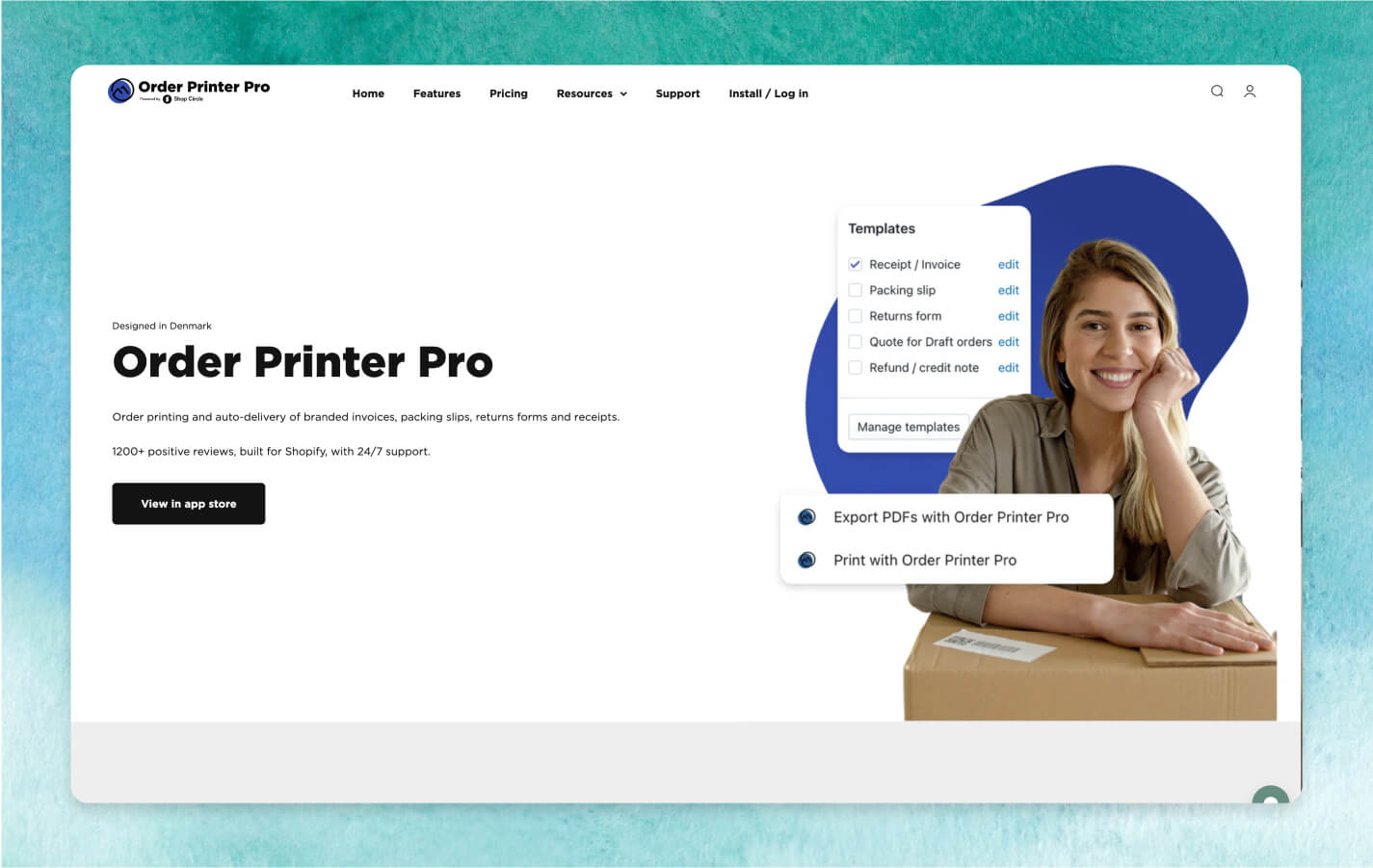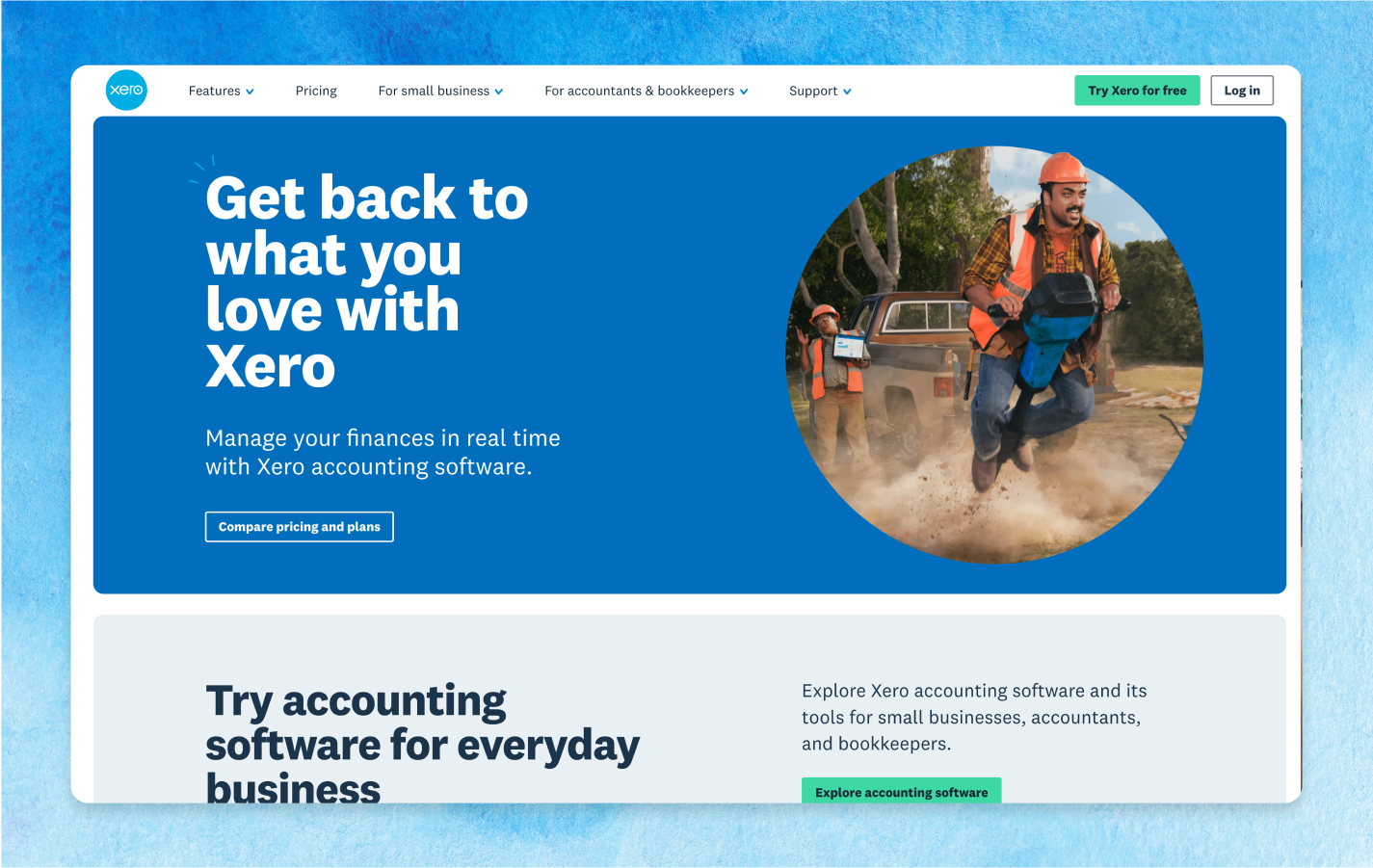Whether you’re taking the first steps away from manual spreadsheets or are looking to invest in a new tool, choosing a B2B invoicing app is a big decision. Wholesale invoicing comes with its own complexities and unique demands. This is especially true when you factor in multiple price lists, varied payment terms, and cross-currency or VAT differences, which many B2B brands have to juggle!
What is B2B invoicing?
B2B invoices are essentially documents that detail payments owed by one business to another in exchange for goods or services. So, if you’re a wholesale brand, you’ll likely send these invoices to the businesses buying from you.
If you’re a B2B eCommerce brand, you likely need to be using invoices - partly to maintain your own accurate records, but also to meet the demands of your customers. Wholesale buyers will often ask for invoices because it helps them manage their inventory, finances, and operational processes.
What do B2B invoices need to include?
Most wholesalers using invoices will include:
- Details of the business issuing the invoice, like the name, address, contact details, and VAT numbers where relevant
- Details of the business/ end customer who needs to pay for their goods
- A unique invoice number and the date of issue
- An itemised list of the products ordered, including quantities and pricing
- A subtotal, VAT or taxes (if relevant), and a final total
- Payment terms (including how to pay and when it’s due)
What’s the difference between B2B and B2C invoices?
There are several key differences between B2B and B2C that impact B2B invoicing. We’ve collated 5 important differences to take into consideration when mapping out your B2B invoice strategy...
| B2C & Retail | B2B & Wholesale | |
|---|---|---|
| Payment terms | B2C customers shopping online most likely pay upfront via card or are given a Buy Now Pay Later (BNPL) option, like Klarna or PayPal to extend the due date. | B2B brands usually offer upfront payments via card, but also offer invoicing, Purchase Orders (POs), and net terms (eg paying in 30 or 60 days) options. Types and terms vary by the customer - for example, upfront payments for new customers and longer terms for trusted, loyal buyers. |
| Order volume and value | B2C orders are typically lower volume as they’re just related to one customer. The value of each order will vary significantly, even for the same customer making multiple purchases. | B2B buyers are likely making larger, higher-value orders as they’re purchasing in bulk. Order value is usually much higher than in B2C transactions as a result. |
| Buying behaviours | B2C buying can be impulse-led or related to seasonal campaigns (like end-of-line sales or Black Friday deals). Retail consumers buy in-store, online, through social channels (like TikTok Shop) or via apps. | Wholesale buyers order in bulk, unsurprisingly, and orders are typically more predictable as it’s based on continuous demand. Seasonal pre-ordering is huge for apparel/ fashion brands, for obvious reasons! |
| Repeat ordering | Consumers are more likely to make one-time purchases rather than buying the same items regularly (aside from personal care, food, and supplements, to name a few!). | It’s very common for B2B buyers to stick with one supplier once they’ve found a good option - which means regular orders to restock sold inventory. Wholesale buying is led by overall demand and is more routine - like ordering the same office supplies each month or restocking coffee shops. |
| Buying influences | Consumers making ‘want’-led purchases buy things spontaneously. Beyond that, they’ll consider price and convenience, as well as loyalty incentives, like discounts and promotions. | Within B2B, buyers want an easy, straightforward ordering experience. They want everything in one place, streamlined processes, and the ability to track and document their purchasing history. Loyalty matters less - but it is evolving… |
How do I choose the right B2B invoicing tool for my eCommerce business?
Investing in a new software solution is a big decision, so it’s important to ensure you know what you need before you get started! Key features to look out for include:
- Customisable invoices that reflect your brand’s identity
- Automated and manual options to suit your workflow
- Branded templates for a polished, professional look
- Downloadable versions for customer records
- All-in-one platforms that integrate with your existing systems
Here are SparkLayer’s 6 top picks for B2B invoicing apps:
To save you hours of research, we’ve analysed 6 great B2B invoicing apps available for eCommerce businesses right now. In no particular order, we have….
1. SparkLayer
Let’s start with a solution that’s purpose-built for B2B eCommerce! SparkLayer is an eCommerce platform that helps brands add B2B functionality directly onto their existing website - and B2B invoicing is a key part of that. For brands looking for seamless integration (especially those already using Shopify, BigCommerce, or Wix), SparkLayer offers a streamlined way to handle everything in one place.
SparkLayer offers invoicing as part of their B2B-feature-rich plans - meaning you’re getting access to wholesale invoicing on top of in-demand functionality like customer groups, bespoke price lists, and custom order rules. SparkLayer is ideal for merchants who want invoicing to be an integrated part of their eCommerce experience, not an afterthought.
Invoices can be generated automatically and customised to match your branding (depending on the plan). They can be viewed and downloaded easily, too. While there isn’t currently an option to send invoices, we’re working on it! On top of this, you’ll enjoy comprehensive onboarding, ongoing access to our global Support team, and (re)training for your team at no extra cost.
While we’re proud of what SparkLayer offers and may be slightly biased, it’s still an objectively strong choice - especially for existing users already taking advantage of our native features.
Pricing: From $149 per month - included in the Growth plan and above. This includes access to all other plan-specific features (like customer groups, bespoke prices, and tailored payment methods) Try SparkLayer Now →
2. Sufio
We’re proud to have a SparkLayer-Sufio integration in place for merchants looking to process B2B invoices through a third party. Sufio focuses on professional invoicing for Shopify users, with automation tailored to eCommerce transactions.
This B2B invoicing app is a good choice for businesses selling internationally thanks to its support for multiple currencies and languages. Self-proclaimed ‘Loved by Accountants’, Sufio offers extensive finance-first, compliant features.
Sufio creates beautifully designed invoice templates with multi-language and multi-currency support. It’s worth noting that, as it’s built with Shopify users in mind, Sufio has some limitations when used with other platforms. It may require additional setup to meet specific business needs and is best used as part of your Shopify ecosystem rather than as a standalone platform.
There’s a reason Sufio is a go-to for Shopify merchants who want branded invoices with minimal manual effort!
Pricing: From $7 per month. Try Sufio Now →
3. Square
Square is known for its user-friendly toolset within omnichannel retail, and its invoicing app is no exception. Designed with small and medium-sized businesses in mind, Square makes it easy to create, send, and manage invoices from one place. With add-on hardware and POS systems, this brand brings the eCommerce experience together.
Square allows you to create unlimited invoices each month - even on their free plan. You can select their pre-made options for retail, hospitality, and beauty brands right out of the box; great for getting up and running quickly. There’s even the option to track your invoices in real-time and set automated reminders for overdue invoices.
There are a few limitations worth noting around customisation, specifically metafield editing. Some of their key features are, understandably, locked behind paid plans, and most payment options come with processing fees. That being said, Square’s invoicing app pricing is pretty reasonable, and the free plan is a strong choice for those after a plug-and-play solution that works out of the box.
Pricing: From $0 per month. Try Square Now →
4. Intuit QuickBooks
Intuit QuickBooks (also referred to simply as ‘QuickBooks’), is best known as accounting software, but its invoicing features are valuable in their own right. For businesses looking for an all-in-one financial solution, QuickBooks sets the standard.
With a range of plans dedicated to overall finance operations, invoicing forms part of QuickBook’s monthly feature set. So, if you’re after a solution that covers your entire accounting operations, QuickBooks invoicing is likely the best B2B app for your eCommerce business.
Digging deeper - QuickBooks supports recurring invoices, as well as payment tracking. You’ll have great insight into what’s going on, speeding up processes while removing manual activities. Their higher plans also include VAT submissions to HMRC as standard; a fantastic add-on that’s a lifesaver for B2B brands wanting to streamline!
It is worth noting, however, that QuickBooks pricing doesn’t include onboarding on their lower plans. This means there’s a relatively steep learning curve, especially for new users from non-technical backgrounds! It’s more expensive than some invoicing-only solutions but is well worth the money if you’re looking for a comprehensive accounting management system.
Pricing: From $14 per month. Try Intuit QuickBooks Now →
5. Order Printer Pro
The Order Printer Pro: Invoice App is a good choice for B2B businesses of all sizes. You’ll have access to professional-looking templates (or can unlock full customisation with some back-end coding work) and can automatically add invoice PDF links to your customers. Order Printer Pro supports multi-currency, VAT, and translation options, too, making it great for global businesses.
This B2B invoicing tool delivers invoices directly to your customers, reducing the reliance on your Sales or Support teams. You can bulk print using your Shopify admin, POS, and mobile phone, too.
With that being said, it’s built for Shopify, meaning non-native users will face limitations. Order Printer Pro: Invoice App pricing is based on your total number of orders, not just those processed via their app and not necessarily linked to your usage. If you’re processing above 50 orders per month, you’ll have to move to their paid plans, starting from $10 per month for 500 orders and scaling in-line.
Pricing: From $0 per month. Try Order Printer Pro Now →
6. Xero
Built for small businesses, Xero is a trusted invoicing app for a reason. With an on-the-go option that allows you to send invoicing from your mobile phone through to one-click payments for your customers, Xero is made for speed and ease. The level of flexibility you get with Xero is great - they understand that not all business takes place at a desk!
In terms of functionality, Xero have packed their invoicing tool with features like bulk invoice drafting, progress monitoring, and editing on the fly. Merchants can easily record payments, create credit notes where needed, and reconcile balances easily.
One thing to note, however, is the limit on the number of invoices you can create through their lower plans - if you go over the suggested range, you’re at risk of experiencing delays and system performance issues. Naturally, their subscription model ramps up in price as you add more users, increase invoice limits per month, or want access to more of their features. Xero’s support set-up isn’t as established as many other similar platforms, which is something smaller or newer businesses may want to bear in mind.
Pricing: From $2 per month. Try Xero Now →
Choose the right B2B invoicing tool for your business
Whether you’re a growing brand just getting started with wholesale or an established hybrid merchant looking to streamline processes, the right invoicing tool can add infinite value! From complete eCommerce solutions like SparkLayer to accounting-led tools like QuickBooks, there’s a huge range of great B2B invoicing apps designed to fit your business…
Interested in how we can support your wholesale set-up - including B2B invoicing? Book a demo with our team now!
Pricing is correct at the time of this post going live; please note that pricing may change so it’s always best to visit their website directly.





